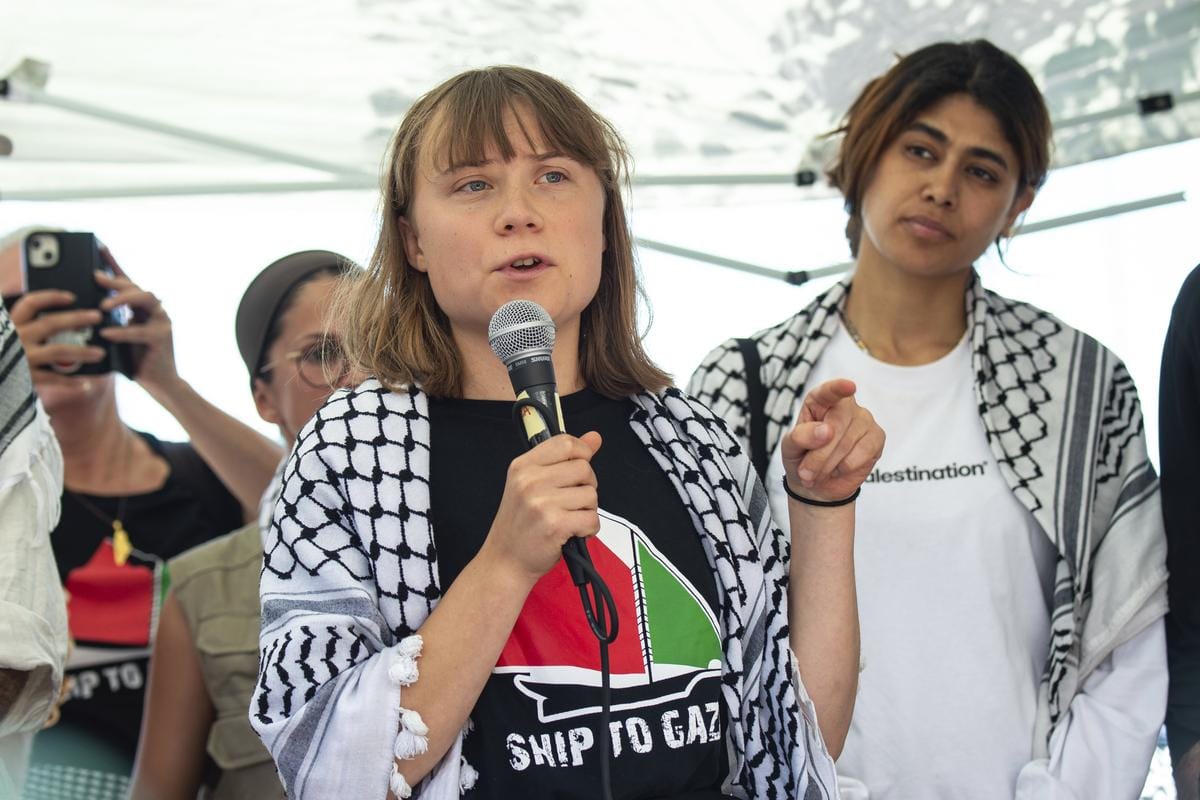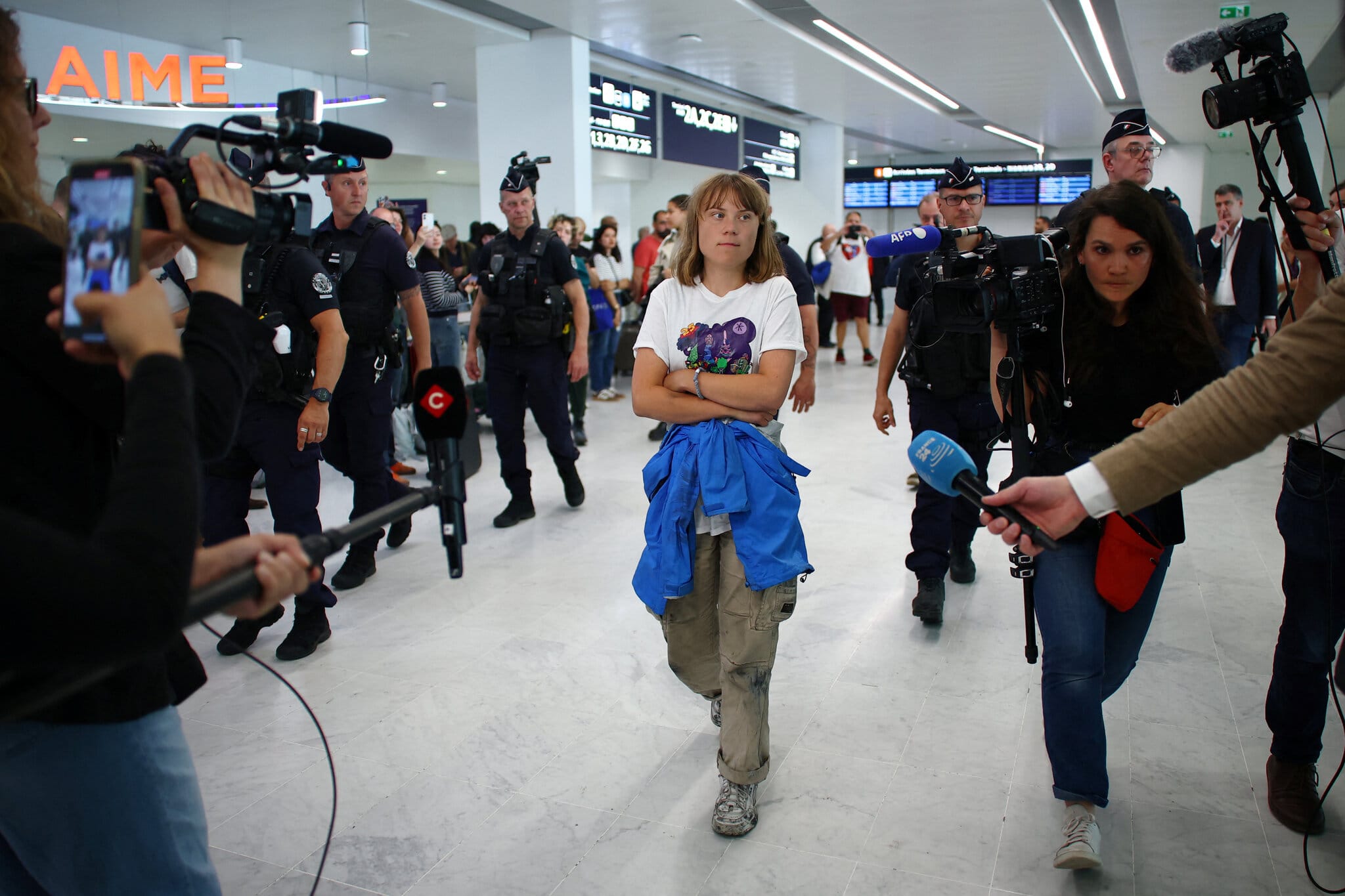‘It is so weird to me that people are separating caring about the climate from caring about humans. We are standing up for justice, sustainability and liberation for everyone.’ – Greta Thunberg, 2025
A few weeks ago, Greta Thunberg, a climate activist from Sweden sailed by boat to Palestine, along with 12 activists, to break the Israeli siege. The boat carried food, baby formula and other essential items for the people of Palestine who have been starved, bombed and killed in the ongoing genocide. This act, marked by remarkable courage, care and empathy has been radicalised and framed as an act against Israel.
However, this is not the only example of the radicalisation of acts of care and empathy, and neither is Greta the only activist in the world to have faced this criticism. In fact, almost anyone questioning the dominant power systems of injustice and inequality or caring for others is being considered as ‘radical’.
In this context, it is important to explore why care and empathy have come to be viewed as radical acts. It is necessary for our current system, marked by crisis and inequality, to demonise these virtues to sustain itself. Our system perpetuates the idea that people are nothing more than workers driven by greed. In doing so, it tries to strip people of human values, reducing them to mere vessels of capitalism. Herein, when activists like Greta put everything, including their lives, on the line, to care for other people- this narrative is challenged.
Their empathy threatens the very foundations of the system and thus it becomes necessary for those in power to radicalise these acts as dangerous and extreme. This tactic is used by dominant systems to protect power and maintain inequality. By analysing the intersections of climate activism, social justice, and power, we contend that reclaiming empathy and in fact, embracing its radical potential, is an urgent strategy in the struggle for a more just and sustainable world.
The capitalist morality
Capitalism, as it currently exists, pretends to stand on the pillars of morality, most commonly expressed through acts of charity. Power constructs morality and virtue through accepted mechanisms like charity, not solidarity or action. In this framework, charity becomes a veil that conceals the structural violence of capitalism (Akudolu, 2023).
While charity is not ontologically evil, it is deceiving and serves to dull the formation of a critical consciousness. People are stirred by suffering and as a result, turn to altruism.This altruism, as constructed by way of charity, offers temporary relief by giving us a way to exercise our care and empathy- which are, in fact, our most fundamental human instincts (Akudolu, 2023).
However, this allowed method of exercising our humanity is only palliative and does not address the systemic roots of suffering (Akudolu, 2023). As Oscar Wilde (Akudolu, 2023) argues, the remedy of charity does not cure the disease but sustains it. This way, systemised charity does not address the poverty created by capitalism by treating the symptoms, while the disease stays untouched.
In its essence, what Greta Thunberg and her accompanying activists are doing is identical to our moral impulse behind charity- providing food for those who are starving.
In its essence, what Greta Thunberg and her accompanying activists are doing is identical to our moral impulse behind charity- providing food for those who are starving. After all, feeding the hungry or protecting the vulnerable is a virtuous and charitable act. But the key difference here lies in how they are exercising this care, which is not by sanctioned palliative measures, but through courageous, sustained, and systemic challenge. Their empathy is active, defiant, and tangible. And this is precisely what unsettles the status quo.
Herein, there are two key reasons why acts like theirs are demonised and labelled as radical, rather than celebrated as expressions of moral virtue. First, their morality is exercised outside the sanctioned, privatised domains where empathy and care are allowed to exist. When empathy moves beyond these confines, it becomes dangerous.
Second, their exercise of morality makes it tangible and poses a direct threat to the dominant narratives. When activists risk their safety, their livelihoods, or even their lives in pursuit of justice for others, their actions disrupt the foundational myth of capitalism- that people are inherently selfish, apathetic, and driven only by individual gain (Zucker, 2025). Their courage and care embody a radical form of morality and kindness, which power must discredit to sustain itself.
From icon to threat: the evolving narrative of Greta Thunberg’s activism
The story of Greta Thunberg serves as a powerful example in this context. Greta started her activism journey at the age of 15 by sitting outside the Swedish Parliament- asking the world to see the climate crisis for what it is: a crisis (FridaysForFuture.org).
Initially celebrated as a brave voice for the planet, Greta became a global icon. But as her activism evolves, calling out capitalism and colonialism as root causes of the climate emergency- the world turned on her. She shifted from being portrayed as a courageous child to being labelled “radical” and “extreme.” Greta is still talking about saving the planet. But she is now talking about working against the very foundations of the climate crisis. She is no more pleading the ruling class to care, but is asking for what is rightfully hers- a future.
Greta always embodied her empathy. But now, her empathy and care are exercised in forms beyond what is permitted by the power. Her critiques are now tangible and so are her actions. This is what makes her a radical.
The climate crisis is deeply tied to the masculine project of domination (Shiva, 2022). Greta’s treatment illustrates this clearly.
Furthermore, her story is also marked by systemic misogyny. The climate crisis is deeply tied to the masculine project of domination (Shiva, 2022). Greta’s treatment illustrates this clearly. Consider Donald Trump’s 2019 tweet: ‘So ridiculous. Greta must work on her anger management problem, then go to a good old-fashioned movie with a friend! Chill Greta, chill!‘ This was more than mockery; it was a gendered dismissal and villanisation rooted in a long history of silencing politically active and opinionated women (Ritson, 2019).

The evolution of the narrative of Greta’s activism thus demonstrates what happens when someone dares to connect the dots between climate, capitalism, and colonialism. Nothing radicalised Greta, because what she’s fighting for is, as a matter of fact, not radical at all. But if power insists on calling it radical, then let us embrace it. Her journey reflects not a radical turn, but a radical clarity. And that is exactly what dominant systems fear.
Morality in action: caring beyond permission
If your actions disrupt the order of things under capitalism, you will be called a radical. Radical is almost an elastic term deployed to vilify those who threaten the status quo. But the world as it stands is already deeply violent. Denial of healthcare, starving people, and the killing of people simply for existing are all acts of radical inhumanity (Hayes and Kaba, 2023). So we must deeply rethink what we call radical.
Radical empathy has the potential to disrupt the harm that our current system requires to sustain itself. Thus, in this context, empathy is radicalised because it is powerful. The ruling class radicalises empathy and care because it threatens the inequality and control that the current system relies on to survive. This deliberate politicisation and radicalisation thus functions as a defence mechanism for entrenched power, recasting social justice movements and activism as threats rather than necessities.
Care, when tangibly expressed, becomes political. Empathy, when collectively exercised, becomes revolutionary.
Care, when tangibly expressed, becomes political. Empathy, when collectively exercised, becomes revolutionary. Care and empathy thus pose significant risks to systems of oppression and inequality. Our morality thus, lies in the act of questioning everything, even morality itself. Activism is morality. Caring is morality. Standing up for justice, for everyone, is morality. Exercising your humanity- fully, honestly and unapologetically- is morality. Morality does not exist in a vacuum. It only exists when we show up for it, even when- especially when- we’re told not to.
We live in daunting times, and must face the reality that our empathy and care cannot stay passive anymore. When the very systems meant to uphold morality break down, we must rise up to save our collective conscience. In a world where empathy is dangerous, it is exactly what is needed. In a world on fire, caring is an act of revolution.
References:
Akudolu, L. O. (2022). Understanding Oscar Wilde’s critique of charity in The soul of man under socialism. Journal of Humanities, Music and Dance, 3(1), 13–16. https://doi.org/10.55529/jhmd.31.13.16
https://fridaysforfuture.org/what-we-do/who-we-are
Hassan, M., Mohammed, Y., & Uddin, R. (2025). Greta Thunberg aboard Gaza flotilla: Doing nothing ‘is not an option’. Middle East Eye. Retrieved from https://www.middleeasteye.net/news/greta-thunberg-aboard-gaza-flotilla-doing-nothing-not-option
Hayes, K. E., & Kaba, M. (2023). Let this radicalize you: Organizing and the revolution of reciprocal care. Haymarket Books.
Ritson, S. (2019). ‘Greta Thunberg: A New Milestone for the Feminist Movement’. Available at: newhistories.sites.sheffield.ac.uk
Zucker, K. (2025). ‘Is capitalism human nature? [OPINION]’. Available at: ghschronicle.com







